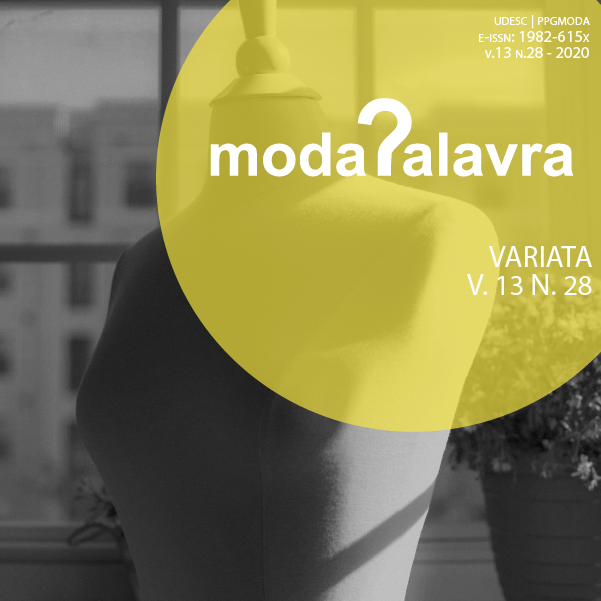Adecolonialtheoretical-policyanalysisonthefashionconceptanditsuses
DOI:
https://doi.org/10.5965/1982615x13272020164Keywords:
fashion, decolonial, capitalismAbstract
From a postcolonial / decolonial perspective, the purpose of the article is to question the western concept of fashion and its possible uses. We understand that the concept of fashion can be used as a notion within the colonial ideological apparatus that seeks to disallow the relationship of non - western societies with time by stating that the latter has no fashion because little change their clothing, or as the colonizer prefers to call it, your costume. This type of binary, in the case of “fashion X costume”, engenders, as Quijano (2005) points out, non - Western societies and provides the West with the ideological status of the movement, its ability to change, renew itself and, w hy not, evolve (in an evolutionary sense). As Said (2007) points out, the colonizer, in his place of authority, understands that it is up to him to “read” the colonized and to translate his culture to himselfDownloads
References
ALLMAN, Jean. Fashioning Africa: Power and the Politics of dress. In.: ALLMAN, Jean (Org.). Fashioning Africa: Power and the politics of Dress. Bloomington: Indiana University Press, 2004;
BALLESTRIN, Luciana. América Latina e o giro decolonial. Rev. Bras. Ciênc. Polít., Brasília , n. 11, p. 89-117, Aug. 2013 . Available from <http://www.scielo.br/scielo.php?script=sci_arttext&pid=S0103-33522013000200004&lng=en&nrm=iso>. access on 22 Feb. 2019. http://dx.doi.org/10.1590/S0103-33522013000200004.
BERNARDINO-COSTA, Joaze; GROSFOGUEL, Ramón. Decolonialidade e perspectiva negra. Soc. estado., Brasília , v. 31, n. 1, p. 15-24, Apr. 2016 . Available from <http://www.scielo.br/scielo.php?script=sci_arttext&pid=S0102-69922016000100015&lng=en&nrm=iso>. access on 16 Mar. 2019. http://dx.doi.org/10.1590/S0102-69922016000100002.
FANON, Frantz. Racismo e cultura. In.: SANCHES, Manuela Ribeiro (org.). Malhas que os impérios tecem> textos anticoloniais, contextos pós-coloniais. Lisboa: Edições 70, 2011;
FREYRE, Gilbero. Sobrados e Mucambos. São Paulo: Global Editora, 2006;
QUIJANO, Anibal. Colonialidade do poder, Eurocentrismo e America Latina. In: Lander, Edgardo. (org.) A Colonialidade do Saber: eurocentrismo e ciências sociais. Perspectivas Latino-americanas. Clacso, Consejo Latinoamericano de Ciências Socialies, Ciudad Autônoma de Buenos Aires, Argentina, 2005, pp.105-127.
RAINHO, Maria do Carmo Teixeira. A cidade e a moda: novas pretensões, novas distinções - Rio de Janeiro, século XIX, A. Brasília: Universidade de Brasília, 2002.
SAHLINS, Marshall. Introdução. In.: Ilhas de História. Rio de Janeiro: Zahar, 2003;
________________ . La pensée bourgeoise: a sociedade ocidental como cultura. In.: SAHLINS, Marshall. Cultura na Prática. Rio de Janeiro: Editora UFRJ, 2004;
SAID, Edward W. Orientalismo: o Oriente como invenção do Ocidente. São Paulo : Companhia das Letras, 2007.
SEGATO, Rita Laura. Gênero e colonialidade: em busca de chaves de leitura e de um vocabulário estratégico descolonial. E-cadernos ces [Online], 18 | 2012, colocado online no dia 01 dezembro 2012, consultado a 16 março 2019. URL : http://journals.openedition.org/eces/1533 ; DOI : 10.4000/eces.1533;
TULLOCH, Carol. Style-Fashion-Dress: from black to post-black. Fashion Theory: The Journal of Dress, Body & Culture. Oxford: Berg Publichers, 2010.
Downloads
Published
How to Cite
Issue
Section
License
Copyright (c) 2020 HELOISA HELENA DE OLIVEIRA SANTOS

This work is licensed under a Creative Commons Attribution-NonCommercial 4.0 International License.
When submitting an article for publication in ModaPalavra e-periodico, the author (s) agree (s) with the following terms:
- Authors maintain the copyright in their manuscripts and grant the journal the right of first publication, with work simultaneously licensed under the Creative Commons Attribution-NonCommercial 4.0 International, which allows sharing the work with the acknowledgment of authorship and the initial publication in the journal without payment ;
- Authors may use the same results in other publications after the first publication, provided that they indicate ModaPalavra e-journal as the original publication medium;
- Authors are authorized to take additional contracts, separately, only after the original publication in ModaPalavra e-journal, provided they indicate ModaPalavra e-journal as the original publication medium;
- Authors are allowed and encouraged to publish and distribute their work online (eg in institutional repositories or on their personal page), only after the editorial process and the first publication, provided they indicate ModaPalavra e-journal as the original publication medium;
- To indicate ModaPalavra e-journal as the original publication medium, authors should use the following text template: "This article was originally published by ModaPalavra e-periodical, under a CC BY NC license, in its volume [insert volume] number [insert number] in the year of [insert year], and can be accessed at: http://www.revistas.udesc.br/index.php/modapalavra/ ";
- The opinions expressed in the articles are the author’s sole responsibility, not necessarily reflecting the journal’s opinion. The publication of any material that is owned and held in copyright by a third party, including – but not limited to - articles, photos or drawings was previously authorized by their representatives to be published in ModaPalavra e-journal.









